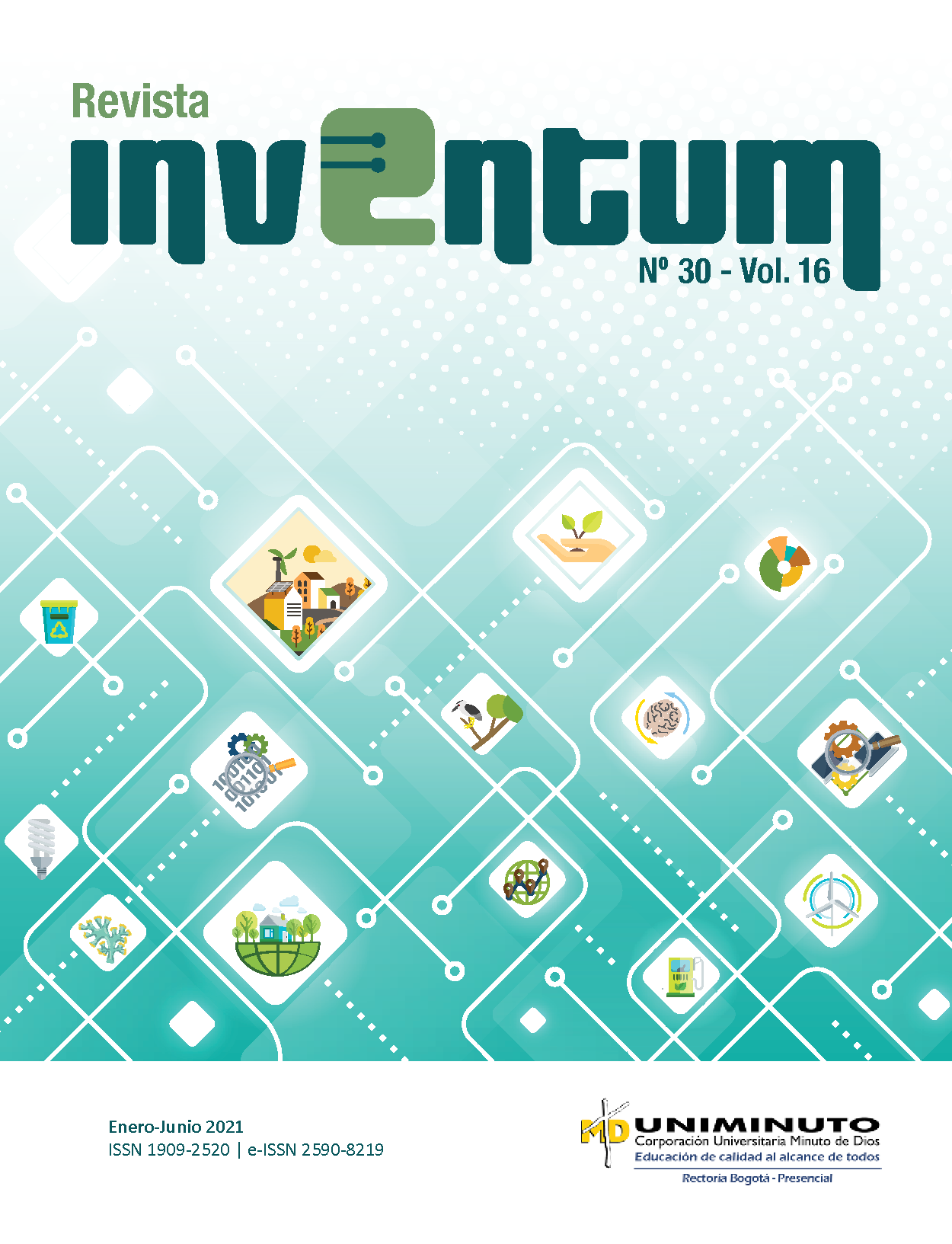Descripción de estrategias para mejorar la calidad de información en órdenes de servicio energético
Barra lateral del artículo
Cómo citar
Detalles del artículo
Se solicita a los autores que diligencien el documento de cesión de derechos de autor sobre el artículo, para que sea posible su edición, publicación y distribución en cualquier medio y modalidad: medios electrónicos, CD ROM, impresos o cualquier otra forma, con fines exclusivamente científicos, educativos y culturales
- La obra pertenece a UNIMINUTO.
- Dada la naturaleza de UNIMINUTO como Institución de Educación Superior, con un modelo universitario innovador para ofrecer Educación de alta calidad, de fácil acceso, integral y flexible; para formar profesionales altamente competentes, éticamente responsables y líderes de procesos de transformación social, EL CEDENTE ha decidido ceder los derechos patrimoniales de su OBRA, que adelante se detalla para que sea explotado por ésta
- El querer de EL CEDENTE es ceder a título gratuito los derechos patrimoniales de la OBRA a UNIMINUTO con fines académicos.
Contenido principal del artículo
Resumen
El presente trabajo tiene como objetivo delinear estrategias para mejorar la calidad de la información en las órdenes de servicio energético, al momento de tomar decisiones en las organizaciones de una manera sistemática, con el fin de obtener un proceso de calidad, de acuerdo a las necesidades de los clientes. Para ello, se sugiere un enfoque pragmático que permita clasificar las diferentes variables que inciden en el desarrollo de las órdenes de servicio en las dimensiones de la calidad de la información.
Se analizaron las órdenes de servicio de los últimos 10 meses donde la información cumplía con los niveles de calidad, y se encontraron inconsistencias en la información al evaluar cada una de las variables establecidas para analizar los niveles de calidad en las órdenes de servicio en una organización prestadora de servicio en Colombia. Los resultados del enfoque propuesto revelan que la exactitud, consistencia y completitud se encuentran un poco alejadas de los propósitos de la organización, evidenciando que la madurez de la calidad aún dista de ser de clase mundial. A partir de este análisis, se recomienda a las organizaciones comercializadoras de servicio de energía una serie de estrategias, cuyo objetivo es fortalecer los procesos de calidad a través de la mejora continua y de una cultura de calidad total. Las soluciones deben iniciar por las variables más críticas asociadas a cada dimensión, con un compromiso de todos los actores involucrados, para lograr una reducción del impacto negativo que generan en las organizaciones comercializadoras de energia.
Referencias
[2] G. Pasi, G. Bordogna, y L. C. Jain, Quality Issues in the Management of Web Information, vol. 50. Berlin: Springer, 2013.
[3] Z. Houhamdi y B. Athamena, «Impacts of information quality on decision-making», Glob. Bus. Econ. Rev., vol. 21, n.o 1, pp. 26-42, 2019.
[4] Á. A. Pulido Castrillón y K. Avendaño Ordóñez, «El hurto de energía y cambios regulatorios en zonas de Cundinamarca: una mirada desde la economía del crimen», Equidad y Desarro., n.o 28, pp. 227-258, 2017.
[5] Comisión de Regulación de Energía y Gas, «Concepto CREG 1699 de 1998», 1998.
[6] D. Ballou, R. Wang, H. Pazer, y G. K. Tayi, «Modeling information manufacturing systems to determine information product quality», Manage. Sci., vol. 44, n.o 4, pp. 462-484, 1998.
[7] E. M. Pierce, «Assessing data quality with control matrices», Communications of the ACM, vol. 47, n.o 2. pp. 82-86, feb-2004.
[8] Z. Houhamdi y B. Athamena, «Information Quality Framework», Glob. Busines Econ. Anthol., vol. 1, n.o March, pp. 182-191, 2015.
[9] J. Whyte, «Data Quality & Data Governance», Kluwer Acad. Publ. New York, USA., vol. 2011, n.o March, pp. 1-25, 2009.
[10] S. Madnick y Wang R.Y., «Introduction to total data quality management (TDQM) research program», MIT Sloan Sch. Manag., vol. Total Data, 1992.
[11] M. Ge y M. Helfert, «A review of information quality Research», IET Conf. Publ., n.o 529 CP, pp. 951-958, 2007.
[12] Linda Kluitmans, «The impact of information quality on strategic decision-making», Master Sci. Oper. Manag. Logist., 2013.
[13] K. S. Ryu, J. S. Park, y J. H. Park, «A data quality management maturity model», ETRI J., vol. 28, n.o 2, pp. 191-204, 2006.
[14] G. N. Kenyon y K. C. Sen, The perception of quality: Mapping product and service quality to consumer perceptions. Beaumont: Springer, 2015.
[15] D. Doronin, S. Lei, y S. H. H. Shah, «Reconsidering concept of knowledge sharing: search for quality dimensions», Kybernetes, n.o 2, 2020.
[16] F. Hinterleitner, Quality of Synthetic Speech. Singapur: Springer, 2017.
[17] C. Batini y Monica Scannapieco, Data Quality: Concepts, Methodologies and Techniques. 2006.
[18] R. Y. Wang y D. M. Strong, «Beyond Accuracy: What Data Quality Means to Data Consumers», J. Manag. Inf. Syst., vol. 12, n.o 4, pp. 5-33, mar. 1996.
[19] L. L. Pipino, Y. W. Lee, y R. Y. Wang, «Data quality assessment», Commun. ACM, vol. 45, n.o 4, pp. 211-218, abr. 2002.
[20] S. Raghunathan, «Impact of information quality and decision-maker quality on decision quality: A theoretical model and simulation analysis», Decis. Support Syst., vol. 26, n.o 4, pp. 275-286, 1999.
[21] R. Price, D. Neiger, y G. Shanks, «Developing a Measurement Instrument for Subjective Aspects of Information Quality», Commun. Assoc. Inf. Syst., vol. 22, 2008.
[22] Z. Hongwei, M. E. Stuart, L. W. Yang, y W. Y. Richard, «Data and Information Quality Research: Its Evolution and Future», en Computing Handbook, 3rd Ed. Chapman & Hall, 2014.
[23] J. I. Pulido Fernández y M. Sánchez Rivero, «Propuesta metodológica para el diseño de un índice sintético de turismo sostenible», Pap. Tur., n.o 41, pp. 27-41, 2007.





